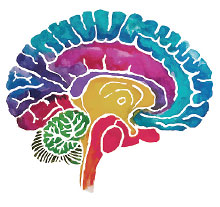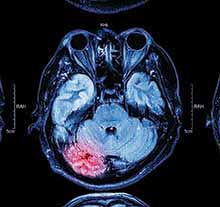Journal Digest: Post-COVID Depression; Locus Coeruleus and Alzheimer’s; CY-BOCS Reliability; and More
Response to SSRIs Robust in People With Post-COVID Depression

People who developed major depression following a COVID-19 infection responded robustly to selective serotonin reuptake inhibitor (SSRI) treatment within four weeks, according to a preliminary analysis appearing in European Neuropsychopharmacology.
Investigators at the Vita-Salute San Raffaele University in Milan, Italy, monitored patients who developed major depression within six months of a COVID-19 diagnosis. The patients were all given an appropriate SSRI medication based on treatment guidelines and had depressive symptoms assessed at baseline and four weeks later using the Hamilton Depression Rating Scale (HDRS).
The study included 60 adults (average age, 55 years): 26 were treated with sertraline, 18 with citalopram, 10 with paroxetine, four with fluvoxamine, and two with fluoxetine. After four weeks, average HDRS among the patients dropped from 23.37 to 6.71, with similar improvements seen between men and women as well as people with or without a history of psychiatric illness. Fifty-five of the 60 patients achieved a clinical response to antidepressant treatment, defined as ≥50% reduction in HDRS score. For comparison, studies in the general population have shown that depressed patients tend to respond to an antidepressant about 40% to 60% of the time, and results may take up to eight weeks.
“SSRI treatment could contribute to the rapid antidepressant response by directly targeting the neuroinflammation triggered by SARS-CoV-2,” the investigators wrote. They acknowledged their findings were from a small observational study, but said the results reinforce that COVID-19 survivors should be routinely screened for emergent depression so it can be promptly treated.
Mazza MG, Zanardi R, Palladini M, et al. Rapid Response to Selective Serotonin Reuptake Inhibitors in Post-COVID Depression. Eur Neuropsychopharmacol. 2021; 54:1-6.
Locus Coeruleus May Offer Clues About Alzheimer’s

Structural changes in a region of the brain called the locus coeruleus may predict the severity of cognitive problems to come for patients with Alzheimer’s disease. These findings, published in Science Translational Medicine, suggest that analyzing this brain region might help to track the progression of Alzheimer’s disease.
The accumulation of amyloid and tau proteins in the brain is known to be associated with Alzheimer’s disease, but these proteins do not predict the severity of cognitive symptoms. Researchers at Massachusetts General Hospital and colleagues decided to examine the relationship between tau buildup in the locus coeruleus and cognitive function after several studies suggested that the locus coeruleus is where abnormal tau first accumulates.
The team took detailed MRI and PET scans of 174 older adults with various levels of cognitive impairment. They found that the greater the accumulation of tau in the locus coeruleus, the more cognitive problems the study participants had. Individuals with a greater buildup of tau in the locus coeruleus also had more biological markers of neurodegeneration in other parts of the brain.
A follow-up analysis of over 3,000 postmortem brain samples from people who participated in other aging studies similarly found that greater accumulation of tau in the locus coeruleus was associated with worse Alzheimer’s outcomes.
The locus coeruleus “might be a promising marker to predict [Alzheimer’s]-related cognitive decline,” the researchers wrote. “These results bolster the idea that structural [locus coeruleus] changes are not merely age-related but reflect initial [Alzheimer’s]-related processes.”
Jacobs HIL, Becker JA, Kwong K, et al. In Vivo and Neuropathology Data Support Locus Coeruleus Integrity as Indicator of Alzheimer’s Disease Pathology and Cognitive Decline. Sci Transl Med. 2021; 13(612): eabj2511.
CY-BOCS Reliably Measures Pediatric OCD Remission, Response

The Children’s Yale-Brown Obsessive-Compulsive Scale (CY-BOCS) can reliably be used to measure treatment response and remission in children with obsessive-compulsive disorder (OCD), the authors of a report in the Journal of the American Academy of Child and Adolescent Psychiatry have concluded.
While researchers use both the CY-BOCS and the Clinical Global Impressions (CGI) scale in clinical trials of children with OCD, many experts say that using both measures has led to challenges when comparing trial results and hampered clinical progress.
A multinational team led by investigators at Yale University assessed individual patient data from 21 pediatric OCD trials encompassing 1,234 children who received psychotherapy, medication, or a multimodal OCD treatment. All included studies that used CGI scores to define response and remission but also measured the children’s CY-BOCS scores. After testing multiple cut-off values, they found that a CY-BOCS improvement of 35% and an absolute CY-BOCS score of 12 or less were optimal cutoffs for OCD response and remission, respectively. Both cutoffs agreed with the CGI criteria about 90% of the time.
The investigators cautioned that the CY-BOCS measures children’s symptoms over a one-week period. “Given that OCD typically presents with a ‘wax and wane’ course of symptoms, it seems advisable that larger periods of sustained improvement (∼1 month) should be experienced before declaring an individual as a ‘positive responder’ or ‘remitter,’” they wrote.
Farhat LC, Vattimo EFQ, Ramakrishnan D, et al. Systematic Review and Meta-Analysis: An Empirical Approach to Defining Treatment Response and Remission in Pediatric Obsessive-Compulsive Disorder. J Am Acad Child Adolesc Psychiatry. September 27, 2021. Online ahead of print.
Hospital Visits for Eating Disorders Rose During Pandemic

Recent studies have shown that the ongoing COVID-19 pandemic has been linked with worsening symptoms of eating disorders (ED) in youth, including binge eating and purging. A report appearing in the October issue of Pediatrics described how the number of children and adolescents admitted for eating disorders at a children’s hospital in Michigan rose steadily during the first 12 months of the pandemic.
The researchers reviewed the medical charts of all individuals aged 10 to 23 who were admitted to Michigan’s C.S. Mott Children’s Hospital between March 2017 and the end of March 2021 for complications related to restrictive eating, such as anorexia nervosa or avoidant/restrictive food intake disorder.
There were 297 ED admissions of youth for medical complications related to eating disorders among 248 patients during the analysis period. The monthly rates remained stable between March 2017 and March 2020, averaging about 56 admissions per year. Between April 2020 and March 2021, however, the hospital saw 125 admissions, with the highest counts occurring near the end of the analysis period.
While there were no significant differences between the ages, sexes, and races/ethnicities of the patients admitted before or during the pandemic, those admitted during the pandemic were less likely to have public insurance than those admitted before the pandemic.
“Although our findings reflect the experience of a single institution, they are in keeping with emerging reports suggesting a developing epidemic within the pandemic, one with the potential to have profound negative effects on the mental and physical health of adolescents around the globe,” the researchers wrote.
Otto AK, Jary JM, Sturza J, et al. Medical Admissions Among Adolescents With Eating Disorders During the COVID-19 Pandemic. Pediatrics. 2021; 148(4): e2021052201.
Immune Molecule C1q May Contribute to Secondary TBI Symptoms

An immune molecule called C1q may contribute to sleep problems or seizures that can manifest weeks or months after a traumatic brain injury (TBI), a study in Science has found. The findings suggest that inhibiting C1q activation shortly after injury may prevent these secondary symptoms.
“[U]nderstanding where, when, and how secondary injuries develop is crucial for preventing or treating disability after TBI,” wrote researchers at the University of California, San Francisco, and colleagues.
To examine the relationship between post-injury inflammation and secondary symptoms of TBI, the researchers studied mice who had been exposed to mild TBI.
While mild TBI typically results in damage to the brain’s cortex, the researchers observed that the mice had elevated levels of C1q at both the site of injury and in the thalamus (an inner brain region involved in sensory and motor function) three weeks after the injury. Readouts from wireless implants in the mice at three weeks also revealed abnormal rhythms indicative of disrupted REM sleep and epileptic activity in the TBI mice compared with the mice who did not experience injury. “Blocking C1q counteracted these outcomes, suggesting that C1q is a disease modifier in [mild]TBI,” the authors wrote.
The researchers noted that C1q antibodies are currently in clinical trials for Guillain-Barré syndrome, a rare immune disorder.
Holden SS, Grandi FC, Aboubakr O, et al. Complement Factor C1q Mediates Sleep Spindle Loss and Epileptic Spikes After Mild Brain Injury. Science. 2021; 373(6560): eabj2685.
ODD More Common in Youth Whose Moms Experienced Depression

Mothers who experience perinatal or postpartum depression are at higher risk of having children diagnosed with oppositional defiant disorder (ODD) by adolescence, according to a study in JAMA Network Open. The risk of ODD was even higher in the children whose mothers had persistent depression throughout pregnancy and the postpartum period.
Researchers at Curtin University in Perth, Australia, and colleagues examined data from 7,994 pairs of mothers and children who were part of the Avon Longitudinal Study of Parents and Children (ALSPAC). As part of the study, mothers completed the Edinburgh Postnatal Depression Scale (EPDS) at weeks 18 and 32 of pregnancy, as well as eight weeks and eight months after the birth of their child. Parents were also asked to fill out the Development and Well-Being Assessment (used to evaluate the presence of ODD) when the children were ages 7, 10, 13, and 15.
Children whose mothers exhibited depressive symptoms (scores of ≥12 on the EPDS) at eight weeks or eight months postpartum were 2.24 and 2.04 times as likely, respectively, to have an ODD diagnosis by age 15 than those whose mothers did not experience postpartum depression. Children whose mothers exhibited depressive symptoms at week 32 of pregnancy were 1.75 times as likely to be diagnosed with ODD as those whose mothers did not experience these symptoms. There was no association between depressive symptoms at 18 weeks of pregnancy and ODD in the children.
Further, children whose mothers showed depressive symptoms across all four timepoints were 3.59 times as likely to be diagnosed with ODD than children whose mothers had no depressive symptoms.
“Our findings, together with existing evidence, suggest that antenatal and postnatal depressive symptoms are associated with an increased risk of child behavior problems and that persistent maternal perinatal depressive symptoms are associated with the highest risk,” the researchers wrote. ■
Dachew BA, Scott JG, Heron JE, et al. Association of Maternal Depressive Symptoms During the Perinatal Period With Oppositional Defiant Disorder in Children and Adolescents. JAMA Netw Open. 2021 ;4(9): e2125854.



